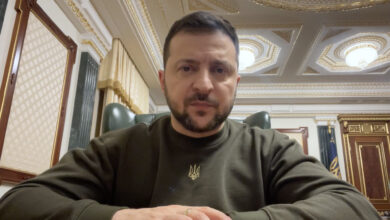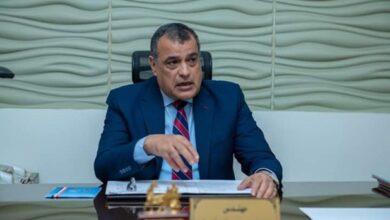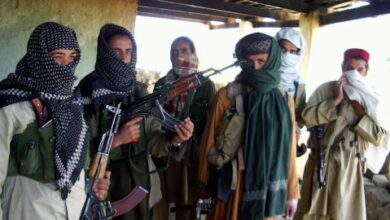The Cairo International Film Festival (CIFF) recognized three film industry professionals of Egyptian origin during a press conference Wednesday for their contributions to cinema. The conference titled “Expatriates that have Excelled Internationally” honored US-based producer Fouad Said, Canadian director Milad Bessada and Scottish actor Khalid Abdalla, who shared their experiences with the press.
Fouad Said: revolutionizing American cinema
Entrepreneur and cinematographer Fouad Said revolutionized American filmmaking by spurring technical advances and creating the first mobile studios that allowed live broadcasting.
While interning for studios including Metro Goldwyn Mayer, 20th Century Fox and Paramount Pictures as a cinematography student, he noticed that the decline in American film production was partially due to production companies’ limited investment in technical development. “The technologies used were about 40 years old,” he said at the press conference. Set building and transport of cumbersome studio equipment represented about 70 percent of production costs, inflating film budgets.
These technical limitations inspired Said to work on a number of practical solutions that brought film production costs down significantly. At the time, Hollywood cameras weighed around 84 kilograms compared to 1-kilogram German cameras, explained Said. He imported German cameras that were adapted to meet Hollywood production standards, allowing cameramen to walk while filming for the first time. He then worked on enhancing the sound and image systems in cameras, adapting wireless technologies to filming and filming in color. But it was Said’s cinemobile – a fully equipped van for on-location shoots – that won him the Best Technical Contribution award from the Hollywood Motion Pictures Academy in 1969.
The cinemobile eliminated the need to construct fake settings as it compressed a studio in a single mobile van, decreasing filming hours and crew size. Said enhanced his innovation by building a transmission system into the cinemobiles that allowed live broadcasts to film studios. This was one of the main factors behind the success of 1960s American TV show “I Spy”, for which Said directed photography. Every six weeks, the show filmed in a different country.
In 1972, the United States Information Agency contacted Said to use cinemobiles for the live coverage of President Richard Nixon’s first visit to China and the USSR during the Cold War. “We had to work 24/7,” said Said, explaining that transmissions only had a 10 percent success rate due to the weather conditions. Nevertheless, Said and his crew succeeded in facillitating the first live news broadcast. Said continued to work as a cinematographer, entrepreneur and businessman and is currently the co-chairman of the multi-billion dollar Said Family Investment Trust.
Milad Bessada, mentor to a generation of Canadian TV directors
A prominent program director on Egyptian television in the 1960s, Milad Bessada travelled to Canada in the 1970s to study. Within a few years, Bessada had become one of the most prominent drama and comedy show directors in Canada, training anchors, directors and television staff at Canadaian TV networks. Bessada’s breakthrough came with the sketch comedy TV show “Second City TV “, which he directed for two years. The show satirized every aspect of entertainment from movies and TV shows to news programs and game shows. Running out of the fictional Melonville television station, the show starred some of the brightest comedians of the time, including John Candy, Catherine O’Hara, Dave Thomas, Andrea Martin. The cast later became the stars of the American show, “Saturday Night Live”, explains Bessada.
Bessada dreamt about being a filmmaker and by the age of 40, he produced and directed his first feature film, A Quiet Day in Belfast. The drama set in Northern Ireland was a great success. Its lead actress Margo Kidder won Best Performance by a Lead Actress at the Canadian Film Awards in 1975. In 1992, Bessada directed the film Search for Diana, which he describes as a love story for Egypt.
Having worked with various TV networks, Bessada is head of North America productions at the ART TV Satellite Network, but his dream remains to produce and direct an Egyptian film that would compete internationally.
Khalid Abdalla, Egypt’s new shining star
Having started his career in theater, Khalid Abdalla has grown to be an internationally acclaimed actor and director best known for his roles in United 93 and The Kite Runner.
At the age of 18, Abdalla directed a production of Someone Who’ll Watch Over Me by Frank McGuinness that was well received at the Edinburgh Festival and earned him five stars in the Scotsman newspaper. Ever since, Abdalla has been exploring various roles and experimenting with collaborative and unconventional filmmaking and production models such as the Free Cinema School in London, UK.
As an actor, Abdalla is best known for his roles in the BAFTA award-winning United 93 in 2006 and the 2008 Academy Award nominated movie The Kite Runner. In United 93, Abdalla played the role of Ziad Jarrah, the lead hijacker of United Airlines flight 93, which was hijacked by terrorists on September 11, 2001. “This role, the role of the terrorist, was one of the most difficult roles I have ever played,” Abdalla said. The 9/11 attacks were tragic for the American people as well as the Muslim world; 3,000 victims died and over 1 billion Muslims were condemned and lumped into a single one-dimensional image of the evil terrorist, he said. Abdallah has often said his main challenge in playing the role of Jarrah was to portray him as a real human being, emphasizing his individuality.
Abdalla’s Egyptian origins have always influenced his work choices as he takes on a personal responsibility for how images of the Middle East are projected in the West. He does not perceive his roles as political though, and says he also chooses roles based on sincerity and creativity of the storyline. Nevertheless, he is aware of the common stereotypes in Western cinema.
“Why do we expect Western cinema to attempt to represent us? We need to build our own voice,” he said during the press conference, at the same time warning against films with a propaganda-like approach. Those contribute to the same stereotypes we complain about as they make simplistic attempts of representation of a diverse region.
Abdalla said he prefers to work with meaningful scripts that are inspired by daily life. The sincerity of the story and portrayal of characters as real human beings will offer the breadth and depth required to engage the region and overcome the common one-dimensional representations, he said.
Abdalla recently finished filming his latest film and first Egyptian picture, The Last Days of the City, after two years of work in Cairo. Abdalla stars in and co-produces the film, which is directed by Tamer el-Saeed. The film was cited as an example of engagement with different production models that is not constrained by the huge budgets standard in Western cinema.
Although vastly different in their ages, experience and specialties, Said, Bessada and Abdalla gave a window into the ideas and challenges that have shaped past and modern cinema and the contributions of three of the industry’s influential players.




